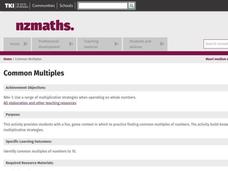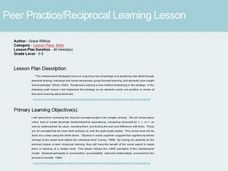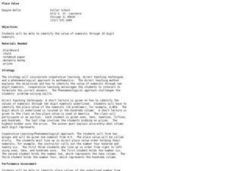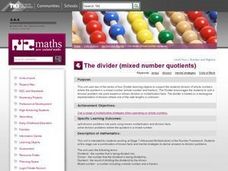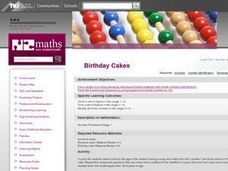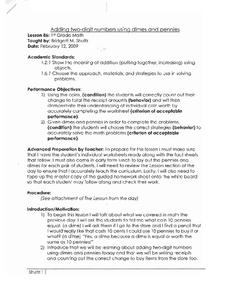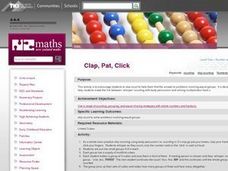Curated OER
The Number Partner
First graders study number pairs and identify number pairs that sum to numbers from 10 to 30. They use number pairs to solve addition and subtraction problems. They make sensible estimates and check the reasonableness of answers.
Curated OER
The Three Cold Kittens
Young scholars solve a math word problem involving repeated addition. They identify the important information in the problem, brainstorm ways to solve the problem, and solve the problem and discuss the solution as a class.
Curated OER
Common Multiples
Fourth graders identify common multiples of numbers to 10. They take turns to throw the two dice. Students after each throw they find the common multiples of these numbers. They cover these numbers with counters. Students each has...
Curated OER
Factor Cards
Students are introduced to the concept of factorization. Individually, they are given seven cards and turn over one card at a time. They take the card and place it on top of the pile and identify the common factor with the one they are...
Curated OER
Reciprocal Learning-Decimal Review
Students use reciprocal learning to coach one another in review of their prior learning about decimals. In this peer reciprocal learning decimal review lesson, students participate in conversation, accountability, roles and...
Curated OER
Solving Word Problems
Students explore the different techniques for solving Word Problems.
Curated OER
Place Value: Identifying Place Value up to Ten Digit Numerals
Learners explore place value up to ten-digit numerals. Students will listen to information on the place value system and use money to bid on prizes, accurately explaining the value of their money using the place value system. They will...
Curated OER
OTC Medications
Students sort medications by likeness and use. They compare and contrast using a Venn Diagram, and find the differences and commonalities of over the counter and Rx medications.
Curated OER
The Difference of Two Squares
Learners practice the use of number properties through exploring the difference of two squares, creating an array model for multiplication, and work with decimal numbers. In groups, students explore patterns in an array and determine...
Curated OER
Algebra: Olympic Races
Students use Olympic athlete statistics to make algebraic calculations. In this algebraic equation lesson, students use algebra to calculate athlete speed and calories burned.
Curated OER
The Three Pigs
Second graders design and construct homes for the three pigs. Each of the homes is made and filled with patterns that we explore. They continue a sequential pattern and describe a rule for this.
Curated OER
Skip it to multiply it
First graders make sensible estimates and check the reasonableness of answers.
They make up, tell and record number stories up to 9 about given objects. They skip count in twos, threes and fives.
Curated OER
The Multiplier (origin of the algorithm)
Students explore basic algorithms for addition, subtraction, and multiplication. They use models to demonstrate solving two-digit by two-digit multiplication. Students demonstrate vertical formats to solve multiplication problems.
Curated OER
More Pizzas and Things
Students are introduced to the problem by playing a guessing game of "I am a number, which is half of 6 and 6, what am I?" They explain their answers and see if anyone else had an alternate solution checking for reasonableness.
Curated OER
The Multiplier (2-digit by 2-digit numbers)
Fourth graders Split a 2-digit number into tens and ones. They use The Multiplier to partition and solve 2-digit by 2-digit multiplications. They describe how to solve 2-digit by 2-digit multiplications using a diagram.
Curated OER
The divider (mixed number quotients)
his unit uses two of the series of four Divider learning objects to support the students division of whole numbers where the quotient is a mixed number (whole number and fraction). The Divider encourages the students to split a division...
Curated OER
Birthday Cakes
Students use basic multiplication and division facts to find simple fractions of an amount. Independently they complete a worksheet of birthday cake problems, solving the fraction problems by drawing a picture to illustrate each cake...
Curated OER
Why Does Money Have Value?
Students study money and its value and usage in the world today. In this economic lesson, students research money as they learn what it stands for, why it is important, how it is valued and what it represents in the United States.
Curated OER
Adding Two-digit Numbers Using Dimes and Pennies
First graders study money. In this addition lesson, 1st graders count and add two-digit numbers using dimes and pennies.
Curated OER
The Divider (whole number remainders)
Third graders use the lesson to support division of whole numbers where there is either no remainder or whole number remainders. They are able to
slit division problems into parts using known multiplication and division facts.
Curated OER
Go Negative
Fourth graders advance to new levels in the lesson we're dealing with here. It is the fourth of a sequence of six dealing with the same theme. These develop from Level 2 to Level 5. In the process they involve number concepts at the...
Curated OER
Decimal Fractions of a Set
Sixth graders practice problem solving equations of fractions, ratios and proportions, addition and subtraction stage 6 as well as advanced additive. Emphasis is placed on decimal fractions and then they convert fractions to decimals.
Curated OER
Guess My Number
Pupils use their knowledge of numbers from one through one hundred to try and identify the teacher's hidden number. They ask questions about the number to narrow down their guess. (Is is a multiple of ten? Is it in the twenties? Is it...
Curated OER
Clap, Pat, Click
First graders practice the art of skip counting to help them find the answer to problems involving equal groups. They are encouraged to make the link between "whisper" counting with body percussion and solving multiplication facts.




